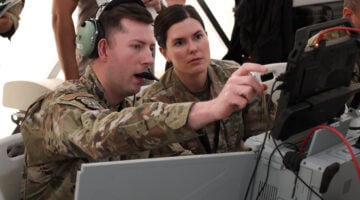
WASHINGTON: Hypersonics and “pitch days,” two of the hottest concepts at the Air Force right now, will come together for the first time Nov. 7. Air Force experts will judge products and ideas from startup firms related to solving key challenges to hypersonic flight, such as Mach 5-plus propulsion and new materials that can withstand extremely high temperatures.
Lt. Gen. Duke Richardson, military deputy to Air Force acquisition czar Will Roper, will oversee the panel of judges who pick the winner of a same-day contract of up to $750,000 to jumpstart their work, according to an Oct. 18 announcement from Air Force Materiel Command’s 96th Test Wing. The pitch day will be held at the Doolittle Institute in Niceville, Fla.
“Fielding hypersonic weapons is a top priority for our warfighters. The Air Force is leading the
way, and we can use all the help we can get from innovative companies,” Richardson said.
“That’s one reason why this pitch day is so exciting.”
“Pitch days” for startup firms, ubiquitous in the Silicon Valley venture capital environment, have become a staple of Air Force efforts to rapidly ingest new technologies, software, data processes and manufacturing tools into service systems development. The first such event was held in March in New York; after the hypersonics day, the next will be “Space Pitch Day” in San Francisco on Nov. 5-6. Of the some 11 total now planned, topics include: “Joint Strike Fighter Pitch Day: Artificial Intelligence, Machine Learning, and Data Analytics” and “Intelligence, Surveillance, and Reconnaissance (ISR) and Special Forces (SOF) Pitch Day.” The dates for future events are announced only once they are scheduled.
A crucial hub in the process is AFWERX, the organization launched by the service in 2017 to foster innovation within the Air Force, and link with innovators in industry, academia and think tanks. AFWERX vetted the companies pitching on hypersonics via their 19.2 Open Innovation Small Business Innovation Research call.
The nine startups on hypersonics are pitching everything from composite materials to small propulsion units. The companies are: GoHypersonic Inc.; UES, Inc.; Powdermet Inc.; Ursa Major Technologies, Inc.; Spectral Energies, LLC; Goodman Technologies LLC; Advanced Silicon Group; Fourth State Communications, LLC; and FAAC, Inc. Videos on each and their offerings are available on the Doolittle Institute website.
A spokesperson for Air Force Material Command’s 96th Test Wing told Breaking D today that the nine startup companies will pitch their wares at the Doolittle Institute in Niceville, Florida. Doolittle is an Air Force Research Laboratory Innovation Institute, focusing on innovation, collaboration and technology transfer, transition and workforce development.
Winning pitch day tech will support the two major Air Force boost-glide hypersonic prototype efforts now underway: the Hypersonic Conventional Strike Weapon and the Air Launched Rapid Response Weapon (AARW).
Lockheed Martin, which perhaps not coincidently is the prime for the F-35 that will eventually carry hypersonic missiles, is building two prototype weapon systems: with a $928 million contract awarded in April 2018 for the Hypersonic Conventional Strike Weapon; and a $480 million contract for the AARW. Both are expected to reach early operational capability by 2022.
DoD has myriad hypersonics projects underway, and is attempting to coordinate early foundational work across service and with agencies such as DARPA. One key linchpin among the services is the Common Hypersonic Glide Body, built byDynetics, which won a $351.6 million contract in August to build at least 20 glide bodies for the Army and the Navy. Some components will be used by the Air Force as well. That said, the Air Force, Army and Navy programs are separate rather than under a joint program office, as my office-mate Sydney explained in detail back in March.

